
Karl Volker
“In Roman Catholic mythology, there exists a figure which has always moved me; namely the child in limbo, the unbaptised child who.can neither go to Heaven, nor to Hell, nor to Purgatory. This child wanders back and forth in all eternity between Heaven and Hell. Since it is not baptised it cannot go to heaven, and having died at birth, it had no opportunity to sin, so it cannot go to Hell. The figure of the child in limbo was, even for conservative Catholics, too much to swallow, and it has therefore been omitted from most Catholic churches. And yet the following book deals with the part of our psyche which could be represented by the unbaptized child in limbo; unbaptized meaning that part of our psyche which has not been touched by the essence of human nature—by erotic, moral, and aesthetic differentiation. “
Adolf Guggenbühl-Craig (The Emptied Soul: On the Nature of the Pyschopath)
“nor in poor Icarus when he could feel,
his sides unwinged because the wax was melting,
his father shouting to him,’That way’s wrong!'”
Dante (Inferno, Canto 17, Mandelbaum, tr.)
Guggenbul-Craig is a neglected figure, to some degree. The above is from the first paragraph to his book on psychopaths. He studied at the Jungian Institute but apparently disliked Jung and his cult of followers (though he did use Jungian theory and lectured at the institute for a decade). He had originally intended to be a pastor and retained his Christian orientation. He adds in a page later, from the same preface: “They are not even politically correct—or psychologically correct. Today it is correct to say that we are all born with a psyche which contains every possibility that exists. { } If, in the course of a life history, some empty psychological space appears, it is only because the faculties could not develop due to adverse circumstances like nasty parents, bad environment, and so on. But to have the impudence to point out an empty space in our own soul; even to claim that there may be human beings who have a deficient eros or no eros at all, and that these people may even be socially well adapted, is just too much to accept.”
This was something I wrote on last time (using an essay by Russell Jacoby on narcissism) where in the contemporary world certain pathologies of character or personality actually serve career advancement (see Peter Thiel, Alex Karp, or Zuckerberg, or Sean Parker, or Sam Altman, or Musk, or Fauci or any of the last ten U.S. presidents, or Ursula Von der Leyen or the bitcoin Bonaparte Emmanuel Macron, or Generalfeldmarschall Merz, or Nazi She Wolf Kasia Kallas, or Keir Starmer, Bill Gates or Jens Stoltenberg, and on and on and on) and this spiritual emptiness may actually be a direct benefit to social standing and even help polish the optics for societal admiration. Men like Starmer benefit from having limited intelligence but the dullard’s inability to know he is hated. Thiel and Parker are more like the ‘true’ psychopath. Whatever they recognized in themselves, early on, was devoted to and developed for the purposes of manipulation and power.
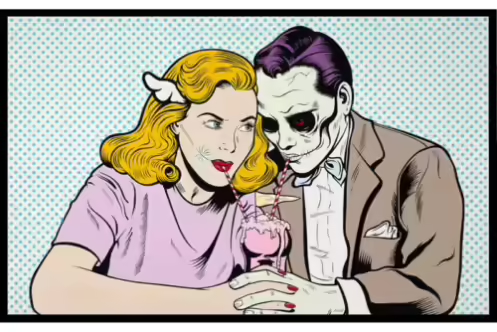
D-Face
These narcissistic (usually) and those lacking in Eros (per Guggenbul-Craig) tend to be relaxed in social contexts. Relaxed and easy going. Those with too much Eros worry and become agitated. Like the old saying ‘never let them see you sweat’. Psychopaths don’t sweat.
“Despite the easy-going charm of many people who have a lack of eros, their lives have a tragic quality, a background sadness characterises them because they feel they lack something which although it complicates life, at the same time gives meaning to it. As a result they yearn for redemption; to be rescued from their own emptiness.”
Adolf Guggenbühl-Craig (Ibid)
Describing contemporary western society as one in which the Patriarch, or his power, is in decline can be misleading. From Jungian perspectives the archetype of the Father is one that exists at a societal level. But we have a society in which the family itself is in, at least, symbolic decline. And mostly this is due to fewer and fewer children. This doesn’t affect the symbolic influence of the Father, which extends to institutions and laws and governance. But the interrupted Oedipal complex has meant the actual living fathers are but pale third generation dupes of real Fathers. And I suspect society today, in the West, is suffering a symbolic slippage.
“We often speak of a “patriarchal” society or of “patriarchal” values. “Patriarchal” implies the rule of the Father. But this fatherliness does not refer to children, to the biological act of procreation, but rather to the structuring of our society, a society in which the archetype of the father is dominant. While the pattern may have originated in the experience of a father’s relationship to his children, it now includes the behavior of an entire society. “
Adolf Guggenbühl-Craig (Ibid)

Heinrich Christoph Fehling (detail Marmohall ceiling, Zwinger)
“According to the contemporary fantasy of health, we must become whole where wholeness is understood in the sense of perfection: “Be ye perfect . . .” The slightest defect, the least malfunction must be cured, removed, or eradicated. Although there was a time when a melancholic temperament was accepted, even idealized, today melancholies are diagnosed as “depressive,” are tranquilized and medicated to the point of being blissful vegetables. “
Adolf Guggenbühl-Craig (Ibid)
Adolf Guggenbühl-Craig gave a lecture on child sex abuse (The Collective Background of Child Abuse), at the Jung Institute, in which he discusses the enormous cloud of psychological mythology surrounding the topic. In the epoch of Epstein and before that the recovered memories hysteria, this feels very apt. And that this mythology was tied into several factors, one of which was deep attachment to a certain brand of ‘innocence’ that is employed with discussions of children. Another factor was a deep (DEEP) seething hatred of fathers, primarily from adult women, and that this was often expressed with an anger at even the idea of ‘studying’ the abuser. These cases were puritanical inquisitions – period. Now, this is also an age in which the West is witness to a live streaming genocide in which a disproportionate number of children have been slaughtered or maimed and crippled. The symbolic figure of the ‘child’ (rather than an actual human child) is one of the cornerstones of this era of white Imperialist decline. That last bastion of a manufactured morality is being shattered. And yet the mythology lives on, and perhaps this is partly the lesson of the psychopathic personalty that succeeds under a system predicated on exploitation. The stupefying of real children with pharmaceuticals, with screen numbing and habituation, is entirely separated from the symbolic (not to be confused with Lacanian terms here). The *ideal child* is symbolic, and is present only in its being abused. The ideal of ‘child’ is a luminous innocent who is debased by contemporary (usually male) violence and sexual predation. The ideal child is not a real child. And it recedes into the psychic shadows when NOT being abused. (except of course that is rare).

Nestor Toro (2015)
“To experience eros is to be rooted. Eros binds to the specific and the particular, to family, to social class, culture, people, language, and nation. Lacking eros one has no connection, one levitates above the world, one has no roots. We are all, as I will repeatedly insist, partially psychopaths. Perhaps this is the reason we are so easily hooked by jet-set fantasies and illusions. Social-climbing must also be counted with the secondary symptoms. De Maupassant’s hero, Belami, provides a precise psychological portrait of the phenomenon. All of Belami’s energy is concentrated on attaining the uppermost rung of the social ladder and finding recognition in that position regardless of the cost to people or morals. The tragedy of psychopaths, their loneliness and despair, is revealed in such social climbing. As outsiders among human beings, invalids lacking an essential something, they can only compensate for their differentness with social success. Their suffering, their depression, and their unloved and unloving qualities are mitigated to some extent through social acceptance.Basically asocial, unconnected to the society in which they live, psychopaths see themselves confirmed by the determining strata of that very society. In addition to the recognition they achieve, psychopaths obtain a sense of power as well. Those who cannot relate to others on an eros level can do so on a power level. “
Adolf Guggenbühl-Craig (Ibid)
As fewer and fewer children are being born, the contradictions of idealizing children intensify. The father of no children is both literal and mythic. The childless parent is more and more a reality today but seems to hold no mythic place in the contemporary cosmos. Even the least fatherly men (Bill Gates for example) are living in the shadow of the Father as a societal myth. The childless parent is not unlike the baby-in-limbo described by Guggenbühl-Craig in his preface.
And there is something else, and that is how society feels as if it lives on the cusp of something (again per the famous Gramsci quote, the previous system is gone and has not been replaced, and until it is we live with the appearance of morbid symptoms).This transitional period has called forth mythology of endings, and beginnings. Of Christian eschatology. And with this come staggering and rarely discussed confrontations with science, in particular theoretical physics (but also its brain dead cousin in the scientific family, computer science).

Alfred Pierre Agache (detail, The Annunciation, 1891)
And if you read this blog you know I have enormous admiration for the late Frank Kermode, probably the best literary critic of the last hundred years (Moretti is close second). In the preface to The Sense of an Ending, Kermode observes “There is the question, also, of our growing suspicious of fictions in general. But it seems that we still need them.” And it is interesting that Kermode notes the growing suspicion of fictions — I take he meant all kinds — as this book was written in 1967. That was a fertile period for the arts, but for historians and critics, too. Who today is the equal of Kermode? The answer is nobody.
“Broadly speaking, apocalyptic thought belongs to rectilinear rather than cyclical views of the world, though this is not a sharp distinction; and even in Jewish thought there was no true apocalyptic until prophecy failed, for Jewish apocalyptic belongs to what scholars call the Intertestamentary Period. But basically one has to think of an ordered series of events which ends, not in a great New Year, but in a final Sabbath { } In Homer, we are told, the Odyssean episodes are related by their correspondence with a cyclic ritual; the time between them is insignificant or null. Virgil, describing the progress of Aeneas from the broken city of Troy to a Rome standing for empire without end, is closer to our traditional apocalyptic, and that is why his imperium has been incorporated into Western apocalyptic as a type of the City of God. And in the journey of Aeneas the episodes are related internally; they all exist under the shadow of the end.”
Frank Kermode (The Sense of an Ending)
Eric Auerbach makes similar points in the opening chapter of Mimesis, which Kermode notes. And here I want to mention in side bar fashion the translation of the Bible, or rather the translations of the Bible. William Tyndale did something remarkable in the 1500s, and John Wycliffe before him in 1300. And Tyndale’s text was used, along with the Latin Bible (the Vulgate) for the King James Bible. And while there is nit picking about accuracy (interceding discoveries have taken place) this remains the absolute best and the foundation of the English language. And if you feel the King James is too archaic then you should stick with tiktok videos, I suppose. The two dumbing down (er, ah, modernizing) translations are the New Jerusalem Bible, published in 1960, and the New American Bible and the less said about the latter the better. The NJB is the Catholic Bible in one sense (it includes the Apocryphal books), but its mostly vastly inferior to the King James. There are now new translations of the New Testament which are admirable (Richmond Lattimore’s is very good indeed) and then the just weird translation of Willis Barnstone. To be fair it was an attempt to ‘restore’ lost books and make some historical adjustments. But changing proper names (Jesus becomes Yeshua, and Mary becomes Miryam). But John the Baptist becomes Yohanan the Dipper and one wonders why nobody made him stop. The Barnstone will in years hence be an amusing curiosity and since he does translate a few obscure texts previously unknown, it will have its uses. But all this points up the grandeur and beauty of the King James version and the miracle of the project altogether.
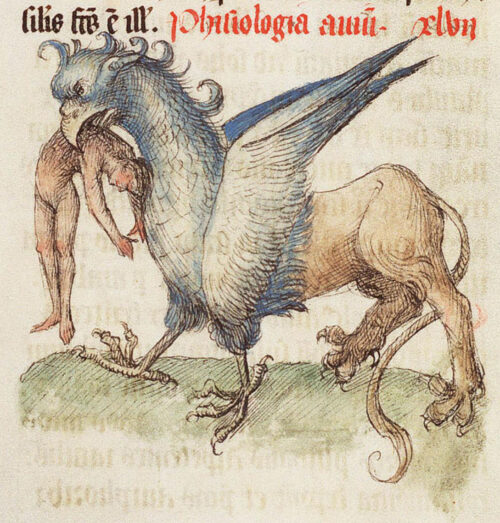
Book of Flowers (1460, artist unknown).
There is one other note on the Barnstone translation and that is that one of the ideas in revising proper names, and using different sources — in places — (Aramaic or Coptic, or Hebrew and Greek etc) was to make it less pro-Roman and less anti-semitic. Also the order changed in a couple places, and the Acts of Apostles became the Activities of the Messengers. This is a useful strategy and in the less known and recently discovered books, it will have value.
“The Bible is a familiar model of history. It begins at the beginning (‘In the beginning…’) and ends with a vision of the end (‘Even so, come, Lord Jesus’); the first book is, the last Apocalypse. { } Apocalypse depends on a concord of imaginatively recorded past and imaginatively predicted future, achieved on behalf of us, who remain ‘in the middest.’ Its predictions, though figurative, can be taken literally, and as the future moves in on us we may expect it to conform with the figures. Many difficulties arise from this expectation. We ask such questions as, who is the Beast from the Land? the Woman Clothed with the Sun? What is meant by this number, and to what events do the Seven Seals refer? Where, on the body of history, shall we look for the scars of that three-and-a-half years’ reign? What is Babylon, who is the Knight Faithful and True?We may be sure that we can from our special point of vantage work out the divisions of history in accordance with these figures, and that we must be right, if only because the state of the world shows so clearly that the second coming is at hand, donee finiatur mundus corruptionis. The great majority of interpretations of Apocalypse assume that the End is pretty near. Consequently the historical allegory is always having to be revised; time discredits it. And this is important. Apocalypse can be disconfirmed without being discredited. This is part of its extraordinary resilience.”
Frank Kermode (Ibid)
Remember again, this is over sixty years ago that Kermode wrote this. The Apocalypse has been kicked down the road a couple times since then, and not just by the Marshall Applewhite. The point, though, is more in how society treats its narratives. Post modernism or post structuralism, somewhat half heartedly it seemed to me, did away with ‘grand narratives’ — but that itself became a grand narrative because there are always grand narratives. Our own lives are narratives and to some degree we treat them as fiction. And we think of them in terms something like grand.
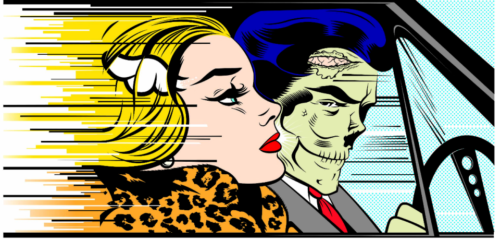
D-Face
The grand narrative is also a meta-narrative. Or usually, and in the post internet culture of the West everything is becoming ‘meta’. As real life recedes, both materially, and cognitively, there is a sense in which institutions come to replace myth. Now the Empire (all empires) have a close relationship to Apocalypse. And they spend some effort to manage apocalypse and to always mediate any insistence on specific dates for end-times. But the myths of the West today, and here science is foremost, have both secularized apocalypse, but also rationalized it and sort of branded it. The entire apparatus of climate propaganda, as an example, is fear mongering but fear mongering always has an implied apocalypse at the end of it. Without apocalypse the threat of rising temperatures just means changing holiday destinations.
I see a correspondence between Apocalypse (however diluted) and the desperation of a declining Empire (those morbid symptoms again). Between (if we are Jungian again for a moment) between archetype and the contemporary symbolic slippage I noted above (fathers without fatherhood). Apocalypse becomes not just diluted by but incorporated into the cult of science, and by extension into the myth of progress. Einstein wrote his general theory of relativity over a hundred years ago. And not really all that much has been added to this idea and theoretical physics has reached an absolute dead end. And this is another source of desperation for the Empire. The new frontier is, of course, digital and all the predictions of android takeover, of AI ruling the world and taking control of everything, etc. This is the new Apocalypse.
The year 1000 was the first prediction for Apocalypse. But it passed without global catastrophe.
“Focillon’s treatment of the year 1000 reflects his interest in the way not only the millennium but the century and other fundamentally arbitrary chronological divisions—we might simply call them saecula—are made to bear the weight of our anxieties and hopes; they are, as he remarks, “intemporal/ but we project them onto history, making it ‘a perpetual calendar of human anxiety.’ They help us to find ends and beginnings. They explain our senescence, our renovations; when we associate them with empire we are celebrating our desire for human kinds of order; when we find rational objections to them we indulge our powers of rational censorship in such matters; and when we refuse to be dejected by disconfirmed predictions we are only asserting a permanent need to live by the pattern rather than the fact, as indeed we must.”
Frank Kermode (Ibid)
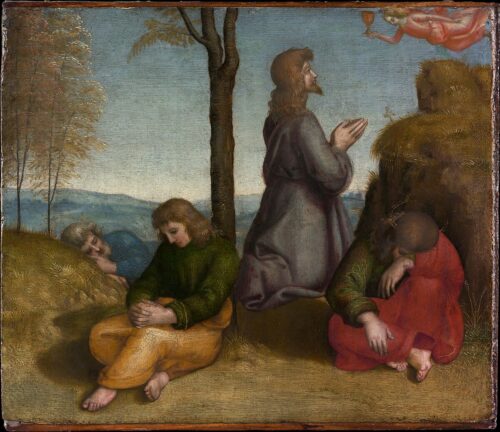
Raphael (Agony in the Garden, 1504)
Kermode then touches on something very Gramscian.
“This is the myth, if we can call it that, of Transition. Before the End there is a period which does not properly belong either to the End or to the saeculum preceding it. It has its own characteristics. This period of Transition seems not to have been defined until the end of the twelfth century; but the definition then arrived at—by Joachim of Flora—has proved to be remarkably enduring.{ } the last transition would begin in 1260, a date arrived at by multiplying forty-two by thirty, the number of years in each generation between Abraham and Christ. This was accordingly taken to be the date of the coming of Anti- christ, and consequently of the figure called the Knight Faithful and True, fidelis et verax, identified with the last emperor. These prophecies had a long life; not only Dante, at the end of the century, but Hegel and others much later, took them seriously. { } The Emperor was important to all interpretations; this was the age of the Dies Irae, in which the Sibyl is coupled with David as an authoritative witness to the Last Days. The death of Frederick ten years early, in 1250, could not halt Joachite speculation. It was condemned in 1260, and subsequently thrived best in unorthodox contexts. Its evangelium aeternum was transmitted by the Brethren of the Free Spirit, by the Anabaptists and by Boehme, by the Family of Love and the Ranters. The Jesus of Blake’s Everlasting Gospel is the Christ of Joachim’s third phase. Some aspects of this brand of apocalypse survive in D. H. Lawrence. More dangerously, the ideology of National Socialism incorporated Joachite elements; “the Third Reich” is itself a Joachite expression. { } End-dominated age of transition has passed into our consciousness, and modified our attitudes to historical pattern. As Ruth Kestenberg-Gladstein observes, ‘the Joachite triad made it inevitable that the present become “a mere transitional stage,” and leaves people with a sense of living at
a turning-point of time.'”
Frank Kermode (Ibid)
And this is unquestionably one of the prevailing myths of the 21st century. The ‘turning point in time’. I wrote some of this before (quoting Kermode, in fact) back in 2021.
https://john-steppling.com/2021/03/the-immunity-bath/
I was going to quote from it, but the entirety seems very relevant to this discussion. I used this quote before, too…
“We project onto the future what we cannot endure as something which already occurred, or which is happening now. We still believe that the worst is yet to come—it is a perspective, but not a reality, and therefore our reality is still not that bad. A fear of the future and anxiety about some indefinite event (“we will all die”) is easier to suffer than a certain, irreparable, and irreversible horror that has just happened (“we are all already dead”).”
Oxana Timofeeva (E Flux, June 2014)
The genocide in Gaza, the continuing theft of land, the obvious interference in the political affairs of other nations, and the absolutely gratuitous sadism and savagery — and so much of it targeting children — will create deeper and more urgent needs to cultural adjustment. New themes in entertainment, in Hollywood (and honestly we are already seeing this) and more irrational political posturing in the EU and South Asia and the commonwealth.
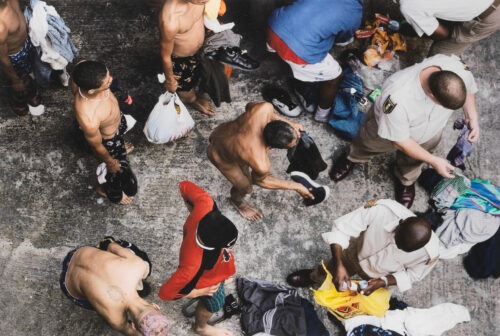
Mikhael Subotzky, photography (Pollsmoor Prison, South Africa)
And its interesting that I wrote the following, back in 2019, in yet another post “And this deeper psychodynamic register is one that also finds expression in the almost impossible popularity of zombie and vampire franchises in film (different but related) and in the increasingly morbid subjectivity that is interconnected with disenfranchised class and economic status, or perceived status, and the sense of hollowed out individualism. The growing or bleeding of awareness that ‘my’ individuality is not very individual. And for the left, for radical voices, and in particular for working class radicals, the toll is enormous. The constant assault and stigmatizing, the subtle humiliations, the lack of respect and/or recognition. It wears one down.”
Morbid subjectivity, which is inextricably bound up with psychopathic disorders. That deeper psychodynamic register, a term Robert Fletcher,Valerie Puleo and Jan Breitling used in their paper (Barbarian hordes: the overpopulation scapegoat in international development discourse :Third World Quarterly, 2014) is in response to the irrational fear of ‘overpopulation’. Now there is no overpopulation, no threat of it, in fact there is demographic collapse throughout the world. A neat segue back to the fact so few people are reproducing. And all of this is neatly bound up and buoyed by the increasingly sterile western sciences. In that same post I wrote this:
The ascension of analytic philosophy runs alongside the entrenched acceptance of *science* as the final authority on not just scientific matters, but also most everything else. { Raymond } Geuss notes the extraordinary influence of Ayn Rand, alongside professional philosophers, positivists like John Rawls. And this influence is hidden for the most part. The idea of being reasonable was embodied in Rawls. In fact the entire public expression of Capitalist logic and the american cover story (Exceptionalism, american dream, etc) were given a style and vocabulary by Rawls.
John Steppling (Nature is Unnatural)
The subjectivity of analytic philosophy is itself borderline. The arid bloodless insistence on decontextualizing race, or gender, or class, is a form of nihilism. The positivists and analytic philosophers faced much the same dead end as theoretical physics. (and Wittgenstein is an outlier here no matter what Grok tells you). We have jumped the track to something beyond apocalypse, in subjectivity. I noted that thinkers like John Rawls, hugely popular and admired, had become the voice of white adulthood. Fast forward thirty years and the Rawlsian voice is digitalized, it is the tech-bro ketamine addled fantasies of Elon Musk and Peter Thiel. Apocalypse is branded as Climate and Covid. The future is now posited in the popular imagination in terms shorn of anything Utopian. Or rather Utopia has been redefined, it is now a sort of constant recalibration of the same.

Nasreen Mohamedi
“…declared incapable of determining the ultimate aims of life { } its ‘sole remaining goal is simply the perpetuation of its co-ordinating activity.”
Max Horkheimer (Critique of Instrumental Reason)
And here there are a few obvious observations, but they relate to the myths that are waning but still exist.
“Rather it is reasonable for me to fear any person who has an amount of wealth/power that threatens the health of society.”
Raymond Geuss (Reality and its Dreams)
It is now the *scale* of inequality that has brought new problems. Having the money to buy political leaders, to buy legislation, to buy whole countries means ideas such as *envy* have changed. Resentment and envy. As Guess notes, this is a rational fear. And here I want to return to Apocalypse, to the influence of Christian thought and beliefs on today’s culture of neurasthenic repetition and fear. The fatherless society is also, of course, the childless society. The Father remains in his abstract form, as allegory, as absent Oedipal narratives, and the child remains, interestingly, without an abstract form. The child is there as the repository for guilt and victimhood.
“To be sure, at some point, as criticism of society becomes more and more radical, purported commitment to potential ‘usefulness’ will begin to ring hollow. I can ask whether one type of thermos is more useful on a trip than another, but once I begin to ask whether it is more useful for me to live or die, or for human society to exist at all or not, the question loses whatever sharp contours it might originally have had. In any case, to put it in the paradoxical way that seemed natural to some of the earlier members of the Frankfurt School, the value of Critical Theory as a form of contemporary philosophising consisted precisely in the fact that it was utterly ‘useless’ in all the usual senses of the term. The same was also supposed to be true of the other two successors of Hegel’s absolute spirit – art and religion.”
Raymond Geuss (The Early Frankfurt School and Religion)
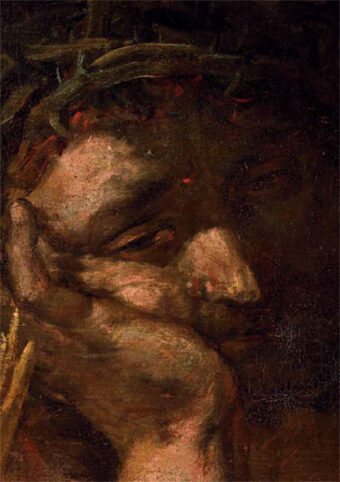
Michael Lucas Leopold Willman (Sorrowful Christ, detail, 1701)
Adorno famously said that arts radical nature is to be found in its uselessness. This, while provocative, is also important. What does usefulness mean? That’s a Wittgenstein question and it also a question that straddles the religious. For religion today must operate (if we mean by religion the examination of something outside normal experience, outside scientific study, something ineffable and transcendent) beyond the realm of AI and screens, and outside the institutional Church. For this is an age of institutional decay. So I think the question is really has western society now created a mass public, a crowd, a society of psychopaths? Or something close to psychopath- and I don’t know, but I think the live streamed genocide in Gaza, and the symbolic mass violence of Zionism itself, its entire history, raises unsettling questions. And I think a return to the the Bible, and then to the Greeks (and Romans) is worthwhile. For if Shakespeare invented the human (per Harold Bloom) then the King James Bible and before that Greek thinkers, especially also Greek tragedy, was how humanity learned to think. And more than learned to think, we learned how to *be*. The ‘turn’, the das ding (Freud, and Lacan) came about — at least operationally — in the time of Thales and then the Oracle at Delphi/Python (though it is possibly better to see it a thousand years before that even) and later still Aristotle and Plato. Though this remains imprecise, the long period before the reconstitution of some of the Mycenaean culture that had fallen to outside hordes, was gradually being revived.
“The king’s disappearance prepared the way, through the long and murky period of isolation and reconstruction we call the Dark Age of Greece, for two interdependent innovations: the institution of the city-state and the birth of rational thought.{ } The Greeks found themselves with a certain form of social life and a kind of thought that in their own eyes constituted their originality and their superiority to the barbarian world: in place of the king who wielded his omnipotence without control or limit in the privacy of his palace, Greek political life aimed to become the subject of public debate, in the broad daylight of the agora, between citizens who were defined as equals and for whom the state was the common undertaking. In place of the old cosmogonies associated with royal rituals and myths of sovereignty, a new thought sought to base the order of the world on relations of symmetry, equilibrium, and equality among the various elements that made up the cosmos. “
Jean Pierre-Vernant (The Origins of Greek Thought)
The Homeric greek world (Geometric period) existed for several hundred years before the Mycenaean transition. The first Greek tragedy was performed around 531 BCE. Sophocles has Oedipus the King first performed in 429-420 BCE. The birth of Tragedy is a topic certainly worth an entire post, perhaps the next one (I never know).
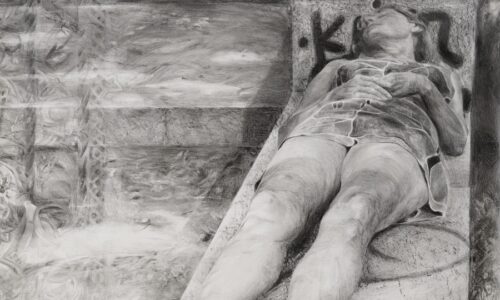
Sarah Navasse Miller
“This egalitarian spirit at the very heart of an agonistic conception of social life is a distinguishing feature of the outlook of the Greek warrior-aristocrats, and it played a part in casting the idea of power in new terms.*Arche* could no longer be the exclusive property of any one person. The state itself was shorn of all private and personal character; having escaped the jurisdiction of the gene, it came to be everybody’s business. The terms a Greek would use to express this concept are striking: he would say that certain deliberations, certain decisions must be brought es to koinon [to the commons], that the ancient privileges of the king and arche itself were set down es to meson, in the middle, at the center. The recourse to a spatial image to express the self-awareness that a human group has acquired, its sense of existing as a political unit, is of value not only asa comparison; it also reflects the creation of a social space that was altogether new. { } the community itself was now projected on the sacred plane, just as at the profane level it found its proper place in the expanse of the agora. What this urban framework in fact defined was a mental space; it opened up anew spiritual horizon. Once the city was centered on the public square, it was already a polis in every sense of the word. “
Jean Pierre-Vernant (Ibid)
The spatial expression of inner belief is found in Cathedral building in the middle ages. In contemporary architecture there is no expression of inner life, though there was certainly during much of the 20th century. The new Obama library is the very erasure of an inner life. But there are many other examples, obviously. And the rise of vernacular architecture serves as a rear guard action to reclaim something human. But I digress.
And I will write more in depth on tragedy, again, next post. But as I have maintained theatre precedes religion.
“To take one example,-the mask would seem to, underline the relation of tragedy to ritual masquerades. But by its very nature and function the tragic mask is something quite other than a religious costume. It is a human mask, not an animal disguise. Its role is not a ritual but an aesthetic one.”
Pierre Vernant and Pierre Vidal-Naquet (Myth and Tragedy in Ancient Greece)
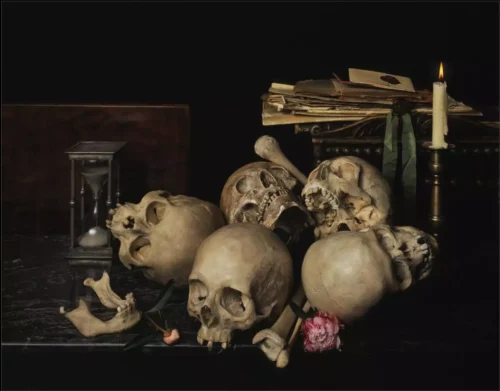
Guido Mocafico, photography.
The defining variable here is ‘the stage’. Greek tragedians, like Shakespeare later, were creating inner life on stage. Theatre, tragedy, is not a reflection of social life, or rather it is, but only after first being transmuted through the psychic life of the author. The Greek tragic playwrights, perhaps paradoxically (though not, really) used much of the legal vocabulary of the time, and this time lasted for a mere one hundred years. The rise of philosophy (as Vernant notes, by the time Aristotle wrote his Poetics Oedipus was a stranger to him. Tragic theatre for the Greeks was the last expression of something Dyonisian, something of a interface between the open air rationality of the polis, and the cloistered exploration of a nature as an unconscious reality. Walter Benjamin saw tragedy as a process of revealing. The meaning (sic) of tragedy is in its performance. It cannot exist outside of its performance. The stage is the scene of the primal crime, it is for each of us our own exile, our own search for home.
The total eclipse of culture by entertainment is one of the most profound expressions of the loss of Eros (per Guggenbühl-Craig), the weakening of ‘both’ Ego and Super Ego, on a collective level, but this is mirrored (to a degree) on an individual level. This is a society now effectively pathological in the deepest sense. It is also the ventriloquist society, and that ventriloquist dynamic is a bastardized form of the Greek mask (and perhaps more that of African mask culture). The aesthetic meaning masks had in Greek tragic drama was complex (and over determined), while today the masks of the media circus, of entertainment, are an anti-aesthetic. In place of mask we have deep fake. Several Israeli companies have almost simultaneously created video deep fake factories. Literally every crime is a deep fake. The society of the cover up, of paranoia and psychosis. Advanced capitalism can barely manufacture entertainment at this point. Every new television series or movie is a remake, or a homage. It is compulsive repetition of the same. Every remake becomes second cousin to deep fake.

Salvo
“…between ego-syntonic morbid impulses and the ego-alien symptoms of compulsion neurotics. But there are also certain transitional forms; some of the “addictions without drugs” can hardly be distinguished from obsessions. Sometimes certain compulsive symptoms, for the most part of a relatively insignificant nature, become secondarily sexualized and serve as a source of pleasure for the ego. They might be called “pleasurable obsessions” and form a transition to perversions. { } The similarity between these compulsive games and children’s games, in which strict rules have to be obeyed, leads us to expect that a secondary sexualization of activities originally serving as defensive measures also plays a part in the psychology of children’s games. Certain hobbies and preferred or obsessive activities, which represent derivatives of infantile autoeroticism, occupy an intermediate position between compulsive acts and perversions.”
Otto Fenichel (The Psychoanalytic Theory of Neurosis)
The appeal of thinking we are in a time of transition, a turning point, is a kind of obsessive projection. National Socialism believed that. Or pretended they did. Zionists do, too. In fact the entire history of colonialism is tinged with a restoration of the lost past, a Joachite fable, usually racialized — for the eugenics minded there is always something Edenic in the background. Adorno’s ‘second nature’ here is relevant. As is a recent wave of pop history. David Christian’s sort of idiotic ‘ Big History’ book being a recent example. For there is both an ideological background to stuff like Christians book (backed up and pimped by Bill Gates and his foundation, and obviously appearing on TED talks). Casey Shoop has a pretty sober and sharp reading of Christian (albeit Shoop himself is pretty susceptible to pop-think in places) and it is remarkable how these pop ideas turn out to be largely fascistic. (If Gates fingerprints are on it, its bad. Period).
“One presentation at the International Big History Association conference in 2014 matter-of-factly compared the borders of European nation-states to the permeable membranes of plant cells, where a “double-filtration system” permits the entry of desirable immigrants while prohibiting the access of less desirable ones. When political theory draws upon a simplistic account of evolutionary biology, such organicist metaphors for historical change dangerously obscure rather than illuminate the social phenomena they seek to explain. For more sophisticated practitioners of Big History like Christian and Spier, the increasing patterns of complexity that are observable within the story of the universe lead,instead, to a highly ambivalent view of the present and the future. While aggrandizing humanity’s “place” within that universal story, especially through the increased capacity of communication technologies to unify diverse cultures and populations, the continued existence of that “place” in which to belong is far from clear.”
Casey Shoop (The Bones in the Concept: Big History, Theodor Adorno and Second Nature)
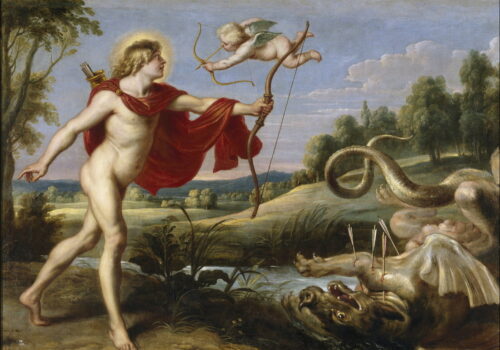
Cornelis de Vos (Apollo and the Serpent, 1636)
This reminds us that climate propaganda, and over-population propaganda, and contagion fears have all been with us for forty plus years. The infection of these pseudo ideas has metastasized deep in the bones of society now (to borrow Shoop’s metaphor). Shoop quotes Benjamin pithily….
“As rocks of the Miocene or Eocene in places bear the imprint of monstrous creatures from those ages, so today arcades dot the metropolitan landscape like caves containing the fossil remains of a vanished monster: the consumer of the pre-imperial era of capitalism, the last dinosaur of Europe.”
Walter Benjamin (The Arcades Project)
The mass homogeneity of digital culture is itself ideological. The satellite photos of earth, the microscopic photography of germs and bacteria, these are alienation effects. I wrote of this before, way back in 2016.
“As children, Bloch points out, there is still an *outside* full of wonder. The attraction, when we are young, of the criminal, the delinquent, the outsider (!) is that they beckon to something institutions are already crushing. The appeal of coastal dwellings is that the represent the edge of the paper on which children draw and scribble. The coast of anywhere contains something of the off-stage, of the unconscious, too.”
John Steppling (Privitized Sirens)
There are less children, and hence less wonder. The psychopath denies wonder. He forces us all to live in a simulation, a horror show seemingly without exit.
To donate to this blog use the pay pal button at the top of the page. (brought to you by Peter Thiel).
donations also help keep the Aesthetic Resistance podcast afloat.

Speak Your Mind